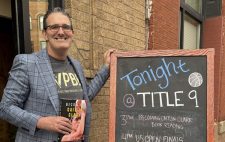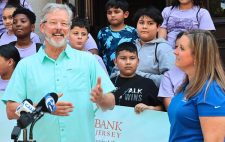It looked like a typical date night – low lighting, candles on the tables and people chatting nervously. But something unusual was happening: a speed dating event created specifically for adults with intellectual and developmental disabilities (I/DD), giving them a rare opportunity to connect, socialize and experience dating in a way that’s often out of reach.
 Inspired by the hit Netflix series “Love on the Spectrum,” the staff at Heart to Heart organized the event. Since 2007, Heart to Heart has served individuals with I/DD across New Jersey and Philadelphia. The hope was adults with intellectual and developmental disabilities could experience dating in a setting tailored just for them.
Inspired by the hit Netflix series “Love on the Spectrum,” the staff at Heart to Heart organized the event. Since 2007, Heart to Heart has served individuals with I/DD across New Jersey and Philadelphia. The hope was adults with intellectual and developmental disabilities could experience dating in a setting tailored just for them.
For the nearly 25 participants, the night offered more than just small talk and cue cards. It offered dignity. Opportunity. And for at least one couple, the start of something new.
“For a long time, I have been talking to these individuals and they expressed to me that they want to have opportunities to live a regular life, the same as anyone else in the community would be living,” says William Pauley, Heart to Heart’s chief marketing officer. “For a lot of people, that starts with dating.”
“Every time we’d meet for their annual service plan,” he adds, “so many would say, ‘I want a boyfriend,’ or ‘I want a girlfriend.’ And the truth is, they don’t usually get that chance.”
That changed this year.
Each detail of the speed dating event was thoughtfully designed. Cue cards with friendly questions like “What’s your favorite color?” or “What’s your spirit animal?” helped break the ice. Staff assisted with transportation and made accommodations for physical and sensory accessibility to ensure everyone could participate fully.
To capture the impact of the event, Heart to Heart also created a short documentary: “Heartfelt Connections: A Night of Friendship, Love & Community.” The film has already inspired others who didn’t attend to get involved in future events.
“My mother found an email about this, and I wasn’t sure if I wanted to go, but it was good to try something new,” said Erica, an attendee, in the documentary.
For many, it was about exploring love for the first time.
“I like it because we got to actually experience what a real date is, in the way that it’s supposed to be,” said David, another attendee.
For many, friendship was the goal.
“I want to start as friends, and if I do meet someone, that would be good too,” said Jamar, who also participated. “My ideal relationship is someone who is basically my best friend.”
For many people with I/DD, dating is full of barriers, from logistical ones like transportation to social ones like stigma. These challenges often mean the dreams that parents hold for their children – of marriage, companionship and shared futures – feel out of reach.
“That hope doesn’t just disappear because your child has a developmental disability,” Pauley says. “Even if it seems unlikely, that hope still lives in the hearts of parents. At the event, some of those same parents were giddy, peeking from behind curtains, watching their adult children flirt and laugh and just be themselves.”
Each five-minute date felt casual and warm, with flexibility built in so participants could take their time or move along if they felt ready.
Out of the entire room, one couple clearly clicked: Jamar and Erica. Jamar lives in one of Heart to Heart’s supervised apartments. Erica doesn’t receive services from the agency but came to the event after her mom saw it announced in a newsletter.
So they took the natural next step: Set up another date.
“I was nervous,” Jamar says. But Heart to Heart made the moment special. He arrived in a limo, picked out a pink rose at the florist – “I wanted one that meant romance” – and met Erica for dinner at her favorite Italian restaurant. Over dinner, they talked about their families, dreams and even a possible tattoo design. Then they went to Dave and Buster’s, where Erica beat him at nearly every game.
“When we were just playing,” Erica said, “we forgot about the world around us.”
Even after the event, the momentum didn’t stop. Not long after, the couple attended Heart to Heart’s prom together, where they joined dozens of others in celebrating their connections in style.
While Jamar and Erica’s story might be the most visible outcome of the event, the deeper impact goes far beyond one budding romance. It challenges the narrative that adults with developmental disabilities don’t want – or deserve – love and connection.
“These individuals are like anyone else in the broader community,” Pauley says. “They’ve just had more restrictions placed on them – not always intentionally, but because of the level of support they need, certain things haven’t been viable.”
Society’s misconceptions can be cruel, he says. Individuals with I/DD are often judged, stigmatized or ghosted after a date simply because of a diagnosis. But, he notes, they’re some of the most resilient people he’s ever met.
“They’re genuinely happy – sometimes even happier than people who don’t face the same challenges,” says Pauley. “That in itself is kind of a beautiful thing.”
Heart to Heart isn’t done. More events, romantic and platonic, are already in the works. And everything the nonprofit does, from speed dating to proms to group outings, is free and open to the community.
“It’s about helping people do things they thought they couldn’t do,” Pauley says. “We’re providing spaces where people feel welcome, included and empowered.”














